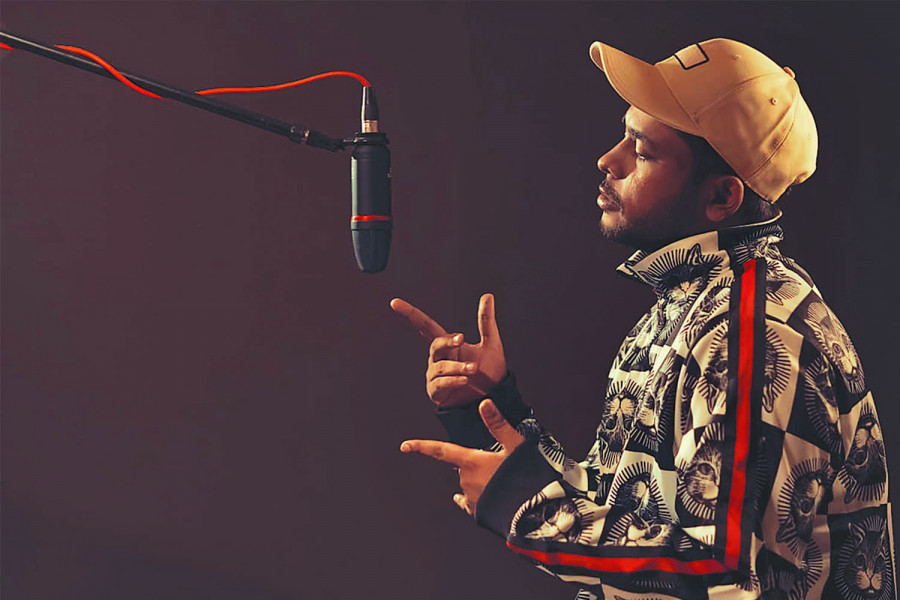
The year is 2013. The sun is bright, up in the sky and you can hear a slight murmur in the streets. After a whole day of football with friends and family in broad daylight, you’re dripping in sweat, gulping down the largest glass of water you could find. Tired from all the exercise, you’re sitting in front of the family computer in the living room, browsing the internet in its barebones form. One window on YouTube catches your eyes and you click it. There, Raw Barz, a cultural phenomenon of the 2010s, fills your eyes and ears—the lyricists make you laugh with disses, hoot when they savagely insult the opponent, and turn the volume down when they start cursing.
A decade has passed since the first episode of Raw Barz, the very episode that introduced rap fans in Nepal and alike to the notorious underdog, Uniq Poet. Since then, Uniq Poet has released a whole array of songs that have made it big, earning himself a massive following across the country and beyond. Hits like KAALO have solidified him as a lyricist and receiving the Tuborg Image Award has set his name in the books. But not many know of his origins in the industry. This feature serves to raise the curtains.
Utsaha Joshi, known by the masses as Uniq Poet, was a poet before becoming a rapper. Writing his first poem in Grade 3, Joshi went on hone his interest and was placed second in a poem writing competition in Grade 6. Even then, his poems differed from the rest in lyrics and tone—“Even then, I’d written a serious poem while a comedy-type poem had taken the first place”, said Joshi.
Joshi focused solely on writing poems until Grade 10, when he discovered rap through listening to the likes of Eminem, Akon, and Nas on MTV. That was when he realised that rap was something he could pull off and began researching on how to turn his poems into raps. Joshi says “seeing African American rappers and their skin colour gave me confidence and I wanted to emulate it.”
Hence, for the next two years, Joshi practised writing lyrics and rapping, taking his skill to a point where the raps he’d posted on Facebook would get attention from people on the NepHop scene back then.
Around the time the recognition started coming in, Joshi’s family insisted that he take up study in the medical field, so he started a Bachelor’s Degree in Public Health, even though his interest lay elsewhere. “I knew I wanted to study something in IT, and I actually wanted to become a game developer,” said Joshi. “I dropped out less than a year into the degree, notifying my family that I had dropped out to pursue something in IT—not just because of rap.”
Through NepHop’s presence on Facebook, Late Rapper Yama Buddha reached out to Joshi and brought him together with some other up-and-coming rappers to begin what we now know as Raw Barz. “In the very first episode, Sacar and I were pitted against each other. I knew that being explicit would get a reaction and I might’ve been incited to do so. In the end, the video went viral. A friend of mine showed me the video without realising that it was me,” said Joshi.
Additionally, through Yama Buddha and the NepHop Network, Joshi was also able to record a mixtape for free, releasing his first - Truth Be Told, Mixtape via Yuva Records.
After a number of battles at Raw Barz by himself and in groups, Joshi started to grow an inkling that he wanted to go solo. Once his group stopped creating music together, Joshi focused entirely on his career as a solo artist. “I had the energy to keep producing music back then, so I did. In that process, I realised that I liked doing it solo and slowly, grew my own separate audience after my group broke apart,” he said.
Since then, Joshi has found better opportunities in both his personal life and his career. With his own songs, Joshi has been able to gain due recognition though numerous hit songs and after receiving the Tuborg Image Award.
In the process of doing so, Joshi has created a long list of songs with lyrics that revolve around what he personally wants to talk about. While coming up with such lyrics, he prefers not to constrain himself and chooses to never make edits once he’s written something down. Over half a decade of experience allows him to simply write what comes to his head, on paper, knowing fully well that a song would come out of it—usually in five to six hours. As was the case with KAALO, one of his hits with rather a serious reference to his origins: “I was casually writing on a beat I liked and didn’t realise how personal the lyrics had become.”
Further into the production process, Joshi also prefers to just write lyrics on a reference beat and let the producer handle the rest—composing, mixing, mastering—giving inputs wherever necessary. Similarly, when music videos are necessary, he lets the videographers do what they’re best at, focusing on just his own craft.
Out of the entire process however, Joshi finds that writing lyrics is his favourite part of being a rapper. “I like writing a couple of lines of lyrics, practising it, writing more, then practising it again,” says Joshi.
Further, what motivates him as an artist is the support and appreciation he receives from the audience, adding that he wants to release a new album and give his listeners what they’ve been waiting for.
In his comment to aspiring rappers, Joshi wants the new generation to do things independently and not sign away their career to an organisation. And to listeners, he wants to release a new album and give the audiences an immersive live experience that leaves an impression similar to the one that has been left on him.












